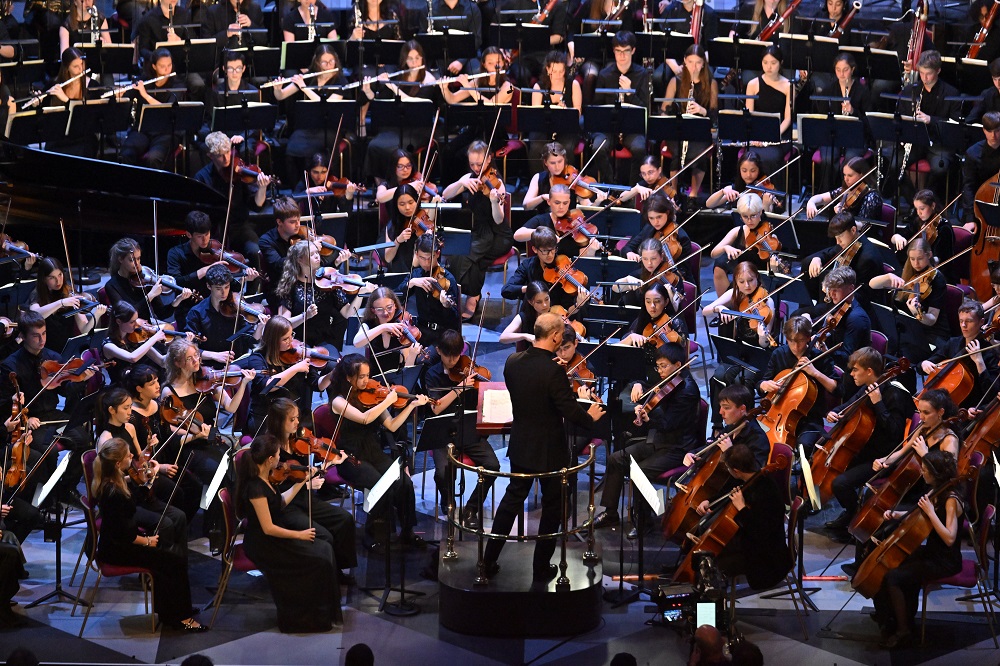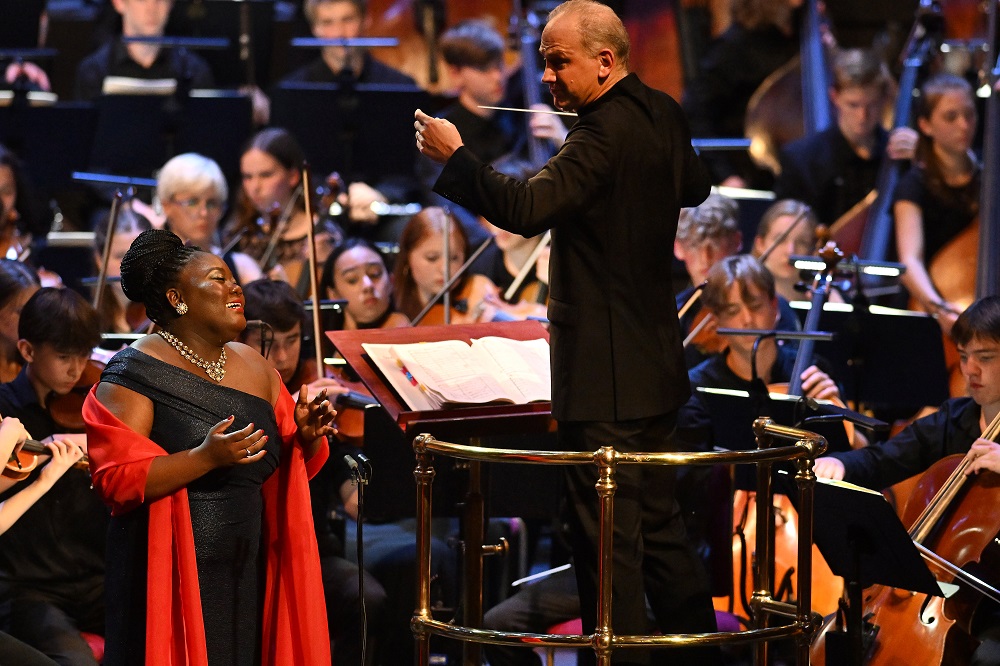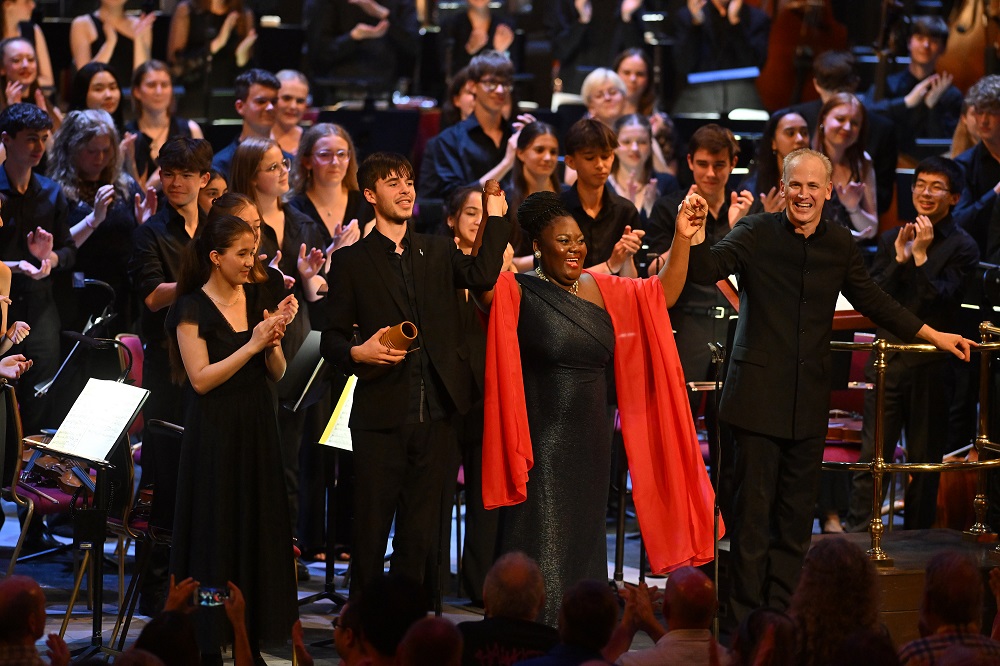Prom 28: Rangwanasha, National Youth Orchestra, Prieto review - playing, and singing, with a swing | reviews, news & interviews
Prom 28: Rangwanasha, National Youth Orchestra, Prieto review - playing, and singing, with a swing
Prom 28: Rangwanasha, National Youth Orchestra, Prieto review - playing, and singing, with a swing
Masabane Cecilia Rangwanasha soars in Strauss, Hindemith effervesces, encores blaze
Programming works from the same decade – in this case the 1940s – can reveal fascinating contrasts: what an impressive gulf, for instance, between two masterpieces by Hindemith and Strauss in this first half, and what sensitivity to very different styles from the NYOGB under Carlos Miguel Prieto. Be careful what you choose as the big symphony, though. I’d always had my doubts about Copland’s Third, and though it couldn’t have been more compellingly lit and shaped, it paled by comparison.
Let’s get the elephant in the Royal Albert Hall room out first, for in every other respect, encores rich in singing and swinging included, this was vintage NYO territory. The Copland showcased the massed and brilliant brass to perfection, above all in the spinning-out of the famous “Fanfare for the Common Man” shaping the identity of the finale. But this is no American colossus. Weirdly, its padding and lack, for the most part, of really striking ideas make it sound oddly like a Soviet Socialist Realist work: the kind Prokofiev and Shostakovich were supposed to write around the same time, but obviated with daring and brilliance. A great symphony composed in America, and dedicated to Copland’s commissioner, Serge Koussevitzky at the helm of the Boston Symphony Orchestra, was premiered not long before: Czech refugee Martinů’s Third, a flamethrower in its progress from darkness to light. 
Glorious South African soprano Masabane Cecilia Rangwanasha, who sprang fully-formed like Athena from the head of Zeus during her years as a Royal Opera Jette Parker Young Artist, could have won the 2021 Cardiff Singer of the World – I don’t say should, because there were three other equally remarkable finalists that year – with her performance of Elisabetta’s big aria in Verdi’s Don Carlo. Last Proms, she sealed the triumph under Oramo in Verdi's Requiem. We had a glimpse of her Strauss in Cardiff too, but here, in the complete Four Last Songs, was proof that she’s ideal in this repertoire too: clear of text (good rolling rs) and mood, but above all soaring with a seemingly effortless radiance, without which the composer’s swansong would be worthless. That was all the more impressive from a distance, though I can’t wait to listen on Radio 3. 
What would the encore be? Strauss’s “Morgen”? No; it was a total surprise, "because you’ve been so good”, Rangwanasha told the audience and absolutely glorious. Fabulous Errolyn Wallen’s arrangement for choir, selected players and soloist of “The whole world in his hands” kept the eyes teary and the goosebumps going. The NYO players have got used to singing too – their Shostakovich 11 punctuated by the revolutionary songs featuring in it will never be forgotten – and this time they learned Xhosa too, while Rangwanasha delivered and swooningly ornamented the familiar text. Wallen, in the audience, could not have looked more excited. 
- Listen to this Prom for the next month on BBC Sounds. BBC Four broadcast to be confirmed
- More classical reviews on theartsdesk
rating
Explore topics
Share this article
The future of Arts Journalism
You can stop theartsdesk.com closing!
We urgently need financing to survive. Our fundraising drive has thus far raised £49,000 but we need to reach £100,000 or we will be forced to close. Please contribute here: https://gofund.me/c3f6033d
And if you can forward this information to anyone who might assist, we’d be grateful.

Subscribe to theartsdesk.com
Thank you for continuing to read our work on theartsdesk.com. For unlimited access to every article in its entirety, including our archive of more than 15,000 pieces, we're asking for £5 per month or £40 per year. We feel it's a very good deal, and hope you do too.
To take a subscription now simply click here.
And if you're looking for that extra gift for a friend or family member, why not treat them to a theartsdesk.com gift subscription?
more Classical music
 Presteigne Festival 2025 review - new music is centre stage in the Welsh Marches
Music by 30 living composers, with Eleanor Alberga topping the bill
Presteigne Festival 2025 review - new music is centre stage in the Welsh Marches
Music by 30 living composers, with Eleanor Alberga topping the bill
 Lammermuir Festival 2025 review - music with soul from the heart of East Lothian
Baroque splendour, and chamber-ensemble drama, amid history-haunted lands
Lammermuir Festival 2025 review - music with soul from the heart of East Lothian
Baroque splendour, and chamber-ensemble drama, amid history-haunted lands
 BBC Proms: Steinbacher, RPO, Petrenko / Sternath, BBCSO, Oramo review - double-bill mixed bag
Young pianist shines in Grieg but Bliss’s portentous cantata disappoints
BBC Proms: Steinbacher, RPO, Petrenko / Sternath, BBCSO, Oramo review - double-bill mixed bag
Young pianist shines in Grieg but Bliss’s portentous cantata disappoints
 theartsdesk at the Lahti Sibelius Festival - early epics by the Finnish master in context
Finnish heroes meet their Austro-German counterparts in breathtaking interpretations
theartsdesk at the Lahti Sibelius Festival - early epics by the Finnish master in context
Finnish heroes meet their Austro-German counterparts in breathtaking interpretations
 Classical CDs: Sleigh rides, pancakes and cigars
Two big boxes, plus new music for brass and a pair of clarinet concertos
Classical CDs: Sleigh rides, pancakes and cigars
Two big boxes, plus new music for brass and a pair of clarinet concertos
 Waley-Cohen, Manchester Camerata, Pether, Whitworth Art Gallery, Manchester review - premiere of no ordinary violin concerto
Images of maternal care inspired by Hepworth and played in a gallery setting
Waley-Cohen, Manchester Camerata, Pether, Whitworth Art Gallery, Manchester review - premiere of no ordinary violin concerto
Images of maternal care inspired by Hepworth and played in a gallery setting
 BBC Proms: Barruk, Norwegian Chamber Orchestra, Kuusisto review - vague incantations, precise laments
First-half mix of Sámi songs and string things falters, but Shostakovich scours the soul
BBC Proms: Barruk, Norwegian Chamber Orchestra, Kuusisto review - vague incantations, precise laments
First-half mix of Sámi songs and string things falters, but Shostakovich scours the soul
 BBC Proms: Alexander’s Feast, Irish Baroque Orchestra, Whelan review - rapturous Handel fills the space
Pure joy, with a touch of introspection, from a great ensemble and three superb soloists
BBC Proms: Alexander’s Feast, Irish Baroque Orchestra, Whelan review - rapturous Handel fills the space
Pure joy, with a touch of introspection, from a great ensemble and three superb soloists
 BBC Proms: Moore, LSO, Bancroft review - the freshness of morning wind and brass
English concert band music...and an outlier
BBC Proms: Moore, LSO, Bancroft review - the freshness of morning wind and brass
English concert band music...and an outlier
 Willis-Sørensen, Ukrainian Freedom Orchestra, Wilson, Cadogan Hall review - romantic resilience
Passion, and polish, from Kyiv's musical warriors
Willis-Sørensen, Ukrainian Freedom Orchestra, Wilson, Cadogan Hall review - romantic resilience
Passion, and polish, from Kyiv's musical warriors
 BBC Proms: Faust, Gewandhausorchester Leipzig, Nelsons review - grace, then grandeur
A great fiddler lightens a dense orchestral palette
BBC Proms: Faust, Gewandhausorchester Leipzig, Nelsons review - grace, then grandeur
A great fiddler lightens a dense orchestral palette
 BBC Proms: Jansen, Royal Concertgebouw Orchestra, Mäkelä review - confirming a phenomenon
Second Prom of a great orchestra and chief conductor in waiting never puts a foot wrong
BBC Proms: Jansen, Royal Concertgebouw Orchestra, Mäkelä review - confirming a phenomenon
Second Prom of a great orchestra and chief conductor in waiting never puts a foot wrong

Add comment